Home / Wrapup: The Key Factors For Determining SN1/SN2/E1/E2
SN1/SN2/E1/E2 Decision
Wrapup: The Key Factors For Determining SN1/SN2/E1/E2
Last updated: October 22nd, 2024 |
SN1/SN2/E1/E2 – Summarizing The Key Factors That Determine Whether A Reaction Will Be SN1, SN2, E1 or E2
In this article we walk through the thought process that will let you determine if a given reaction goes through a SN1, SN2, E1, or E2 pathway.
It assumes that you know how to draw the product of a reaction if you are told what pathway is operating. If you aren’t sure how to draw the product of a reaction if you’re told it’s SN1/SN2/E1/E2, then I suggest going back to the individual articles on those topics for a refresher. [SN1 SN2 E1 E2]
Note that this series covers alkyl halides (and its relatives) but not alcohols. For more on alcohols, skip ahead to the alcohol chapter (Elimination reactions of alcohols)
- Look for a good leaving group on an alkyl (sp3-hybridized) carbon.
- Determine if the carbon bearing the good leaving group is primary, secondary, tertiary or methyl.
- Identify the strongest nucleophile/base that is present.
- Note the temperature, if given (heat tends to favor elimination)
- The identity of the solvent can also indicate SN2, particularly with weakly basic nucleophiles. With strongly basic nucleophiles (RO(-) and HO(-) ) on secondary alkyl halides, double check with your instructor which reaction pathway tends to operate (E2 or SN2)
This article used to be called the “Quick N’ Dirty Guide to SN1/SN2/E1/E2″. It’s been revised to make it a little less quick and a little less dirty, but hopefully more comprehensive and useful. [Note 1]
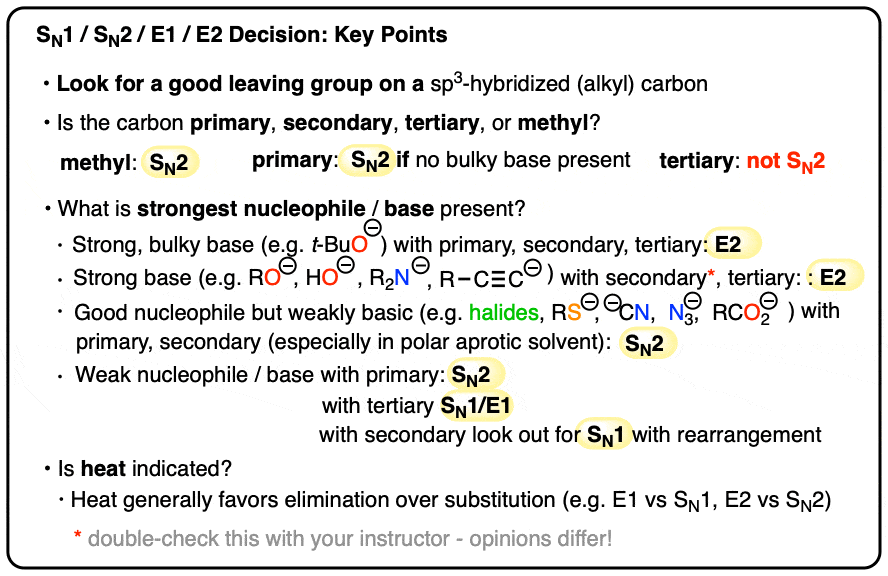
You need to be logged in a MOC Member to see all the quizzes in this post. It’s affordable ($10/month) and many people have found it useful in preparing for their exams. There are roughly 2700 quizzes and counting, as well as accompanying “cheat sheets” and also the Reaction Guide.
Table of Contents
-
- The SN1/SN2/E1/E2 Decision
- Step 1: Identify a Good Leaving Group
- Step 2: The Leaving Group Should Be On An Alkyl (sp3-hybridized) Carbon
- Step 3: Identify The Carbon As Primary, Secondary, Tertiary (or Methyl)
- Step 4: Identify The Base/Nucleophile
- Step 5: The Role of Temperature
- Step 6: Solvent, And SN2/E2 With Secondary Alkyl Halides And Strong Nucleophiles
- Notes
- Quiz Yourself!
- (Advanced) References and Further Reading
1. SN1/SN2/E1/E2 : Wrapup
(Formerly, “The Quick N’ Dirty Guide To SN1/SN2/E1/E2″)
Here we are at the end of our series on determining whether a reaction is SN1, SN2, E1, or E2. It’s time to recap all of the steps in the deductive reasoning required to determine which reaction pathway is operating.
Note that this article assumes that you are able to draw the correct product of a reaction if you already know what the most likely reaction pathway is. If you are already told ahead of time what mechanism is operating, then you don’t need this article.
However, if you’re at all unsure on how to draw the product of an SN2 or E2 reaction if you’ve been given the starting materials and reactants, then you should to go back to articles on the various reactions for a refresher before coming back here.
This series also assumes you know a few key concepts such as, “What Makes a Good Leaving Group?“, What Makes a Good Nucleophile?, What Factors Influence Carbocation Stability? .
With that throat-clearing out of the way…
Let’s say you’re given a reaction and are asked to draw the major product without being told what mechanism is operating.
In order to draw the major product, you’ll need to figure out what mechanism the reaction proceeds through – if the reaction proceeds at all (yes, “no reaction” is also a possibility!).
In this post, we’ll walk through the thought process necessary to arrive at a reasonable conclusion.
Once you’ve determined what mechanism is operating, then you’ll need to apply the pattern of bonds formed/broken for each reaction to give you the correct product.
2. Step 1: Identify A Good Leaving Group
The first step in determining whether a reaction proceeds through SN1/SN2/E1/E2 is to identify a good leaving group in the substrate (e.g. alkyl halide) where the reaction could conceivably take place.
Good leaving groups are weak bases (See article – What Makes A Good Leaving Group?).
If you recall that “the stronger the acid, the weaker the conjugate base”, it stands to reason that the halide ions (Cl– , Br– , I– but not F) and sulfonates (TsO– and MsO– ; see Tosylates and Mesylates) are great leaving groups.
Carboxylates (RCO2– ) are the conjugate bases of carboxylic acids (pKa of about 4) and can also be decent leaving groups. Under acidic conditions (not covered in this series, but covered in the chapter on alcohols), water (H2O) and alcohols (ROH) can be good leaving groups.
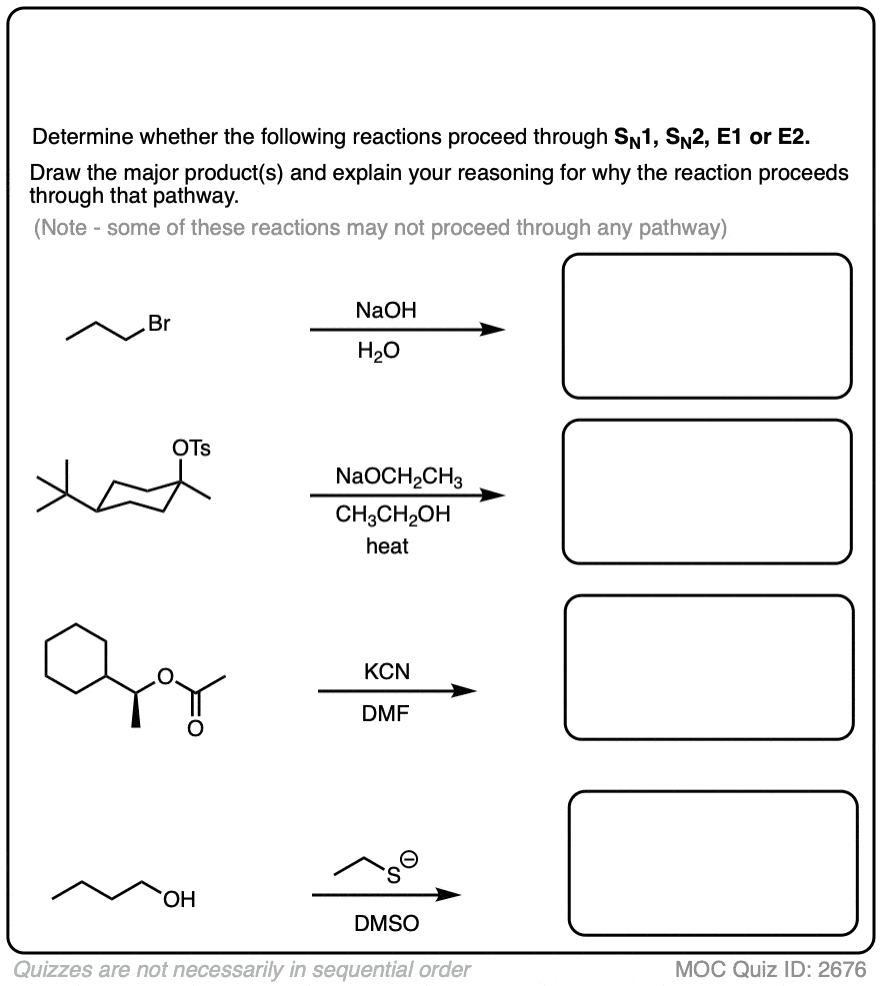 Click to Flip
Click to Flip
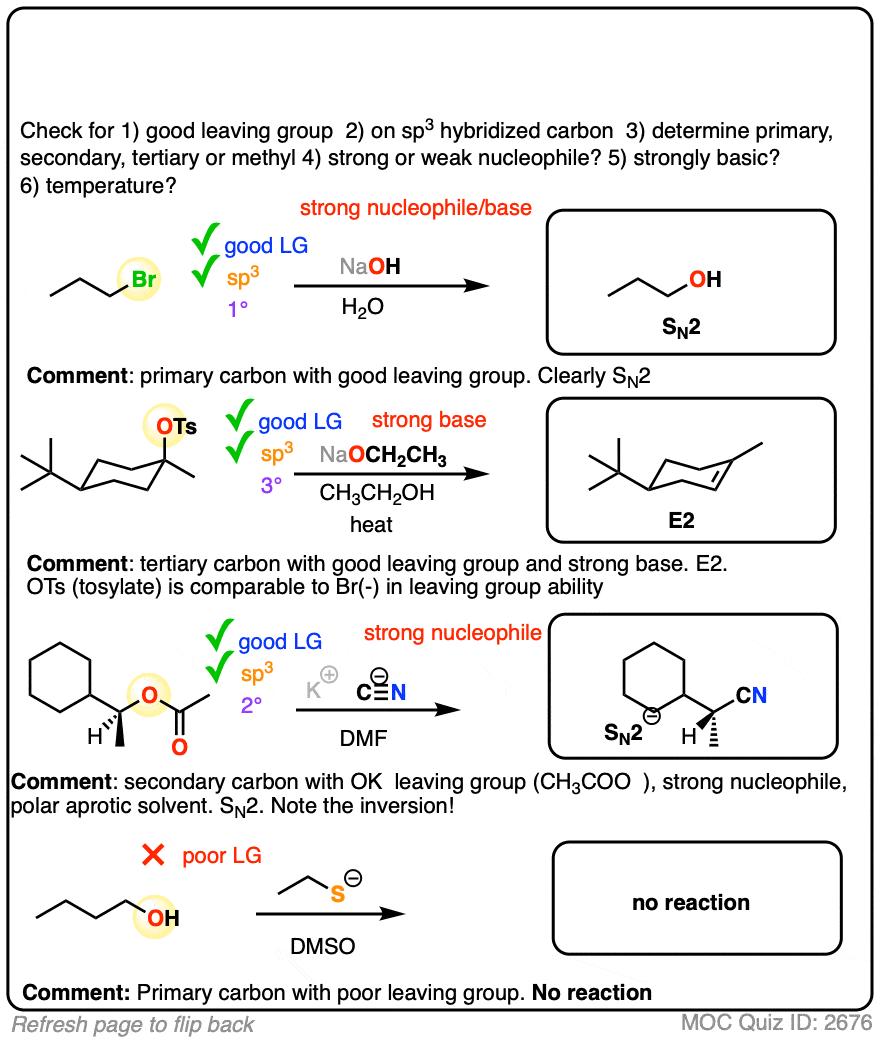
Some prominent examples of poor leaving groups include
- Fluoride ion – the C-F bond is extremely strong (about 130 kcal/mol) and it is thermodynamically difficult to break the C-F bond.
- Hydroxy (HO) and alkoxy (RO) groups in the absence of acid
- Amines (NH2 , NHR, NR2) are too basic to be good leaving groups. However ammonium salts (-NR3+) can be good leaving groups.
- Hydride (H-) and alkyl
- Finally, cyano (CN) and thio (SR) are also generally poor leaving groups for SN1/SN2/E1/E2 reactions.
3. The Leaving Group Must Be On An sp3 Hybridized Carbon
While a good leaving group is a necessary condition for SN1/SN2/E1/E2 to take place, it’s not a sufficient condition.
The leaving group also has to be bonded to a carbon that is capable of undergoing backside attack (SN2), capable of being a stable carbocation (SN1/E1) or reasonably effective at stabilizing partial positive charge (SN2/E2).
For this reason only alkyl carbons – i.e. sp3 hybridized, tetrahedral carbon – can undergo SN1/SN2/E1/E2, with one limited exception we’ll cover in the chapter on alkynes and sticks out like a sore thumb (see Alkynes via Elimination Reactions).
[See article – Identifying Where SN1/SN2/E1/E2 Reactions Happen ]
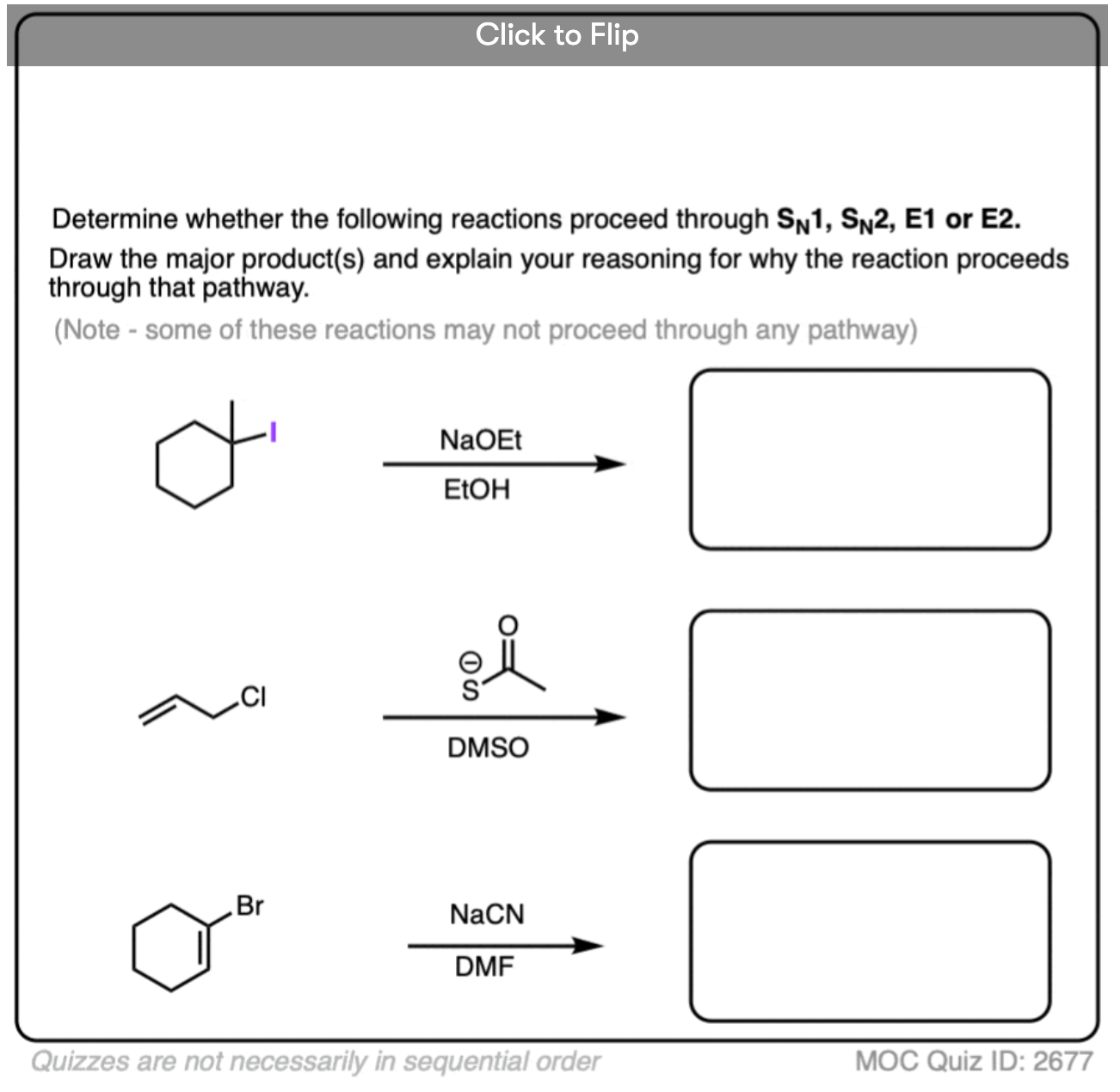
Become a MOC Member to see the clickable quiz with answers on the back.
Once you’ve identified a good leaving group on an sp3-hybridized carbon, you’re ready for the next step.
4. Identify the Carbon As Primary, Secondary, Tertiary or Methyl
If you’ve identified a good leaving group on an alkyl (sp3-hybridized carbon) then the next step is to classify that carbon as primary, secondary, tertiary or methyl. [See Primary, Secondary, Tertiary In Organic Chemistry].
The number of carbons directly attached to the carbon bearing the leaving group has a profound impact on its reactivity since it will affect its steric hindrance (less steric hindrance for primary, more steric hindrance for tertiary) and ability to stabilize positive charge as a carbocation (less stability for primary, more stability for tertiary).
See article: [Deciding SN1/SN2/E1/E2: The Substrate]
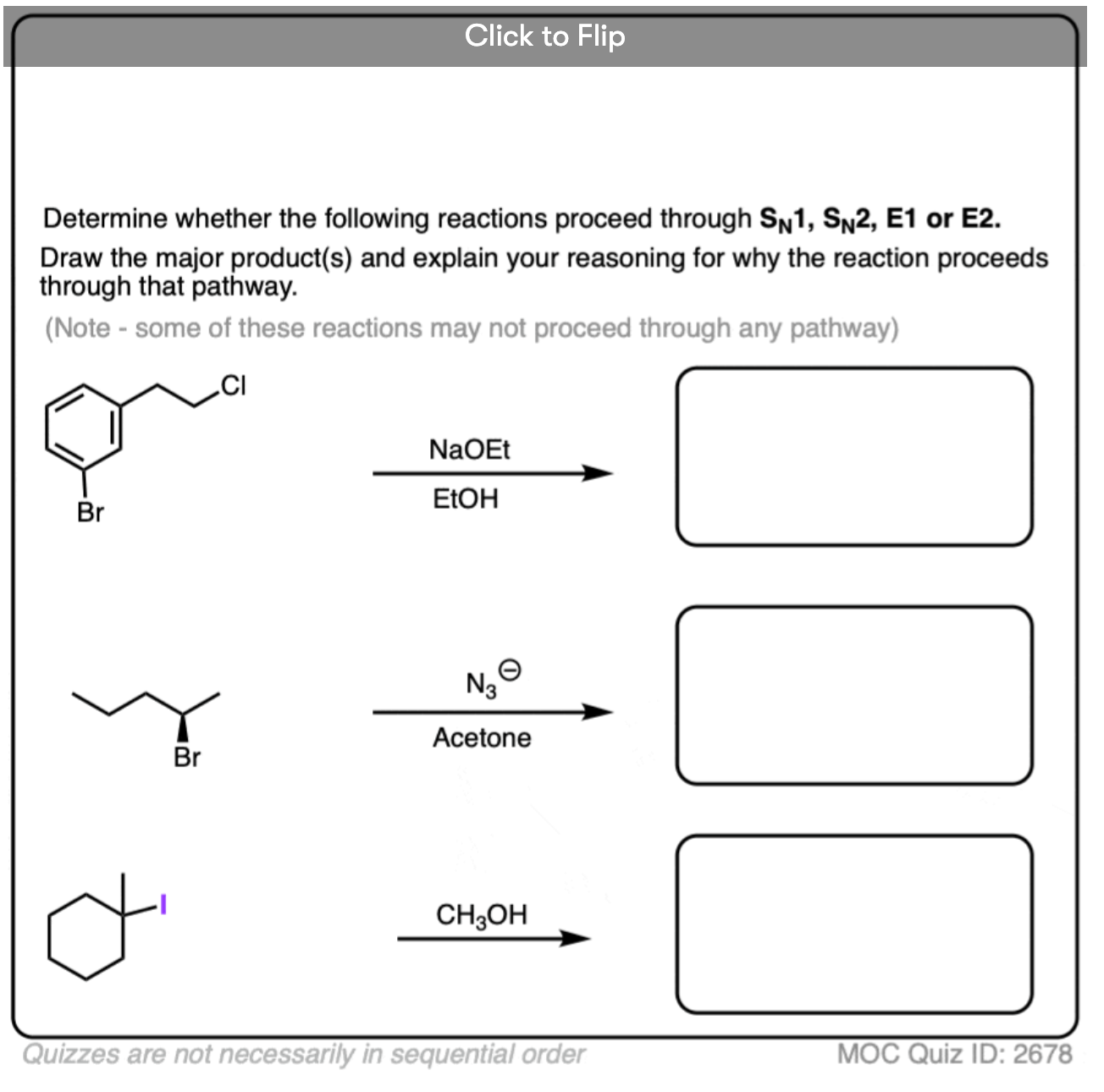
Become a MOC member to see the clickable quiz with answers on the back.
At this stage, identifying the carbon bearing the leaving group as primary, methyl or tertiary carbons will be helpful at ruling certain reactions in or out.
- If it’s methyl, it’s SN2
- If it’s primary, it’s SN2 unless a strong, bulky base is added. [Note 2]
- If it’s secondary, you can’t rule anything out yet.
- If it’s tertiary, rule out SN2 due to steric hindrance (SN1, E1, E2 all possible)
5. Identify The Strongest Base / Nucleophile
The next step is to identify the nucleophile / base that is participating in the reaction.
For our purposes, focus on the strongest base/nucleophile that is present, and ignore anything that is weaker.
By “strongest”, I generally mean focus on negatively charged bases/nucleophiles first, as they will be more likely to participate in these reactions than neutral bases/nucleophiles. [Note 3]
For example, if you see NaOEt/EtOH, focus on NaOEt (which, ignoring sodium, we can just think of as CH3CH2O(-) for our purposes), since the conjugate base is always the better nucleophile.
See article: Deciding SN1/SN2/E1/E2: The Nucleophile/Base
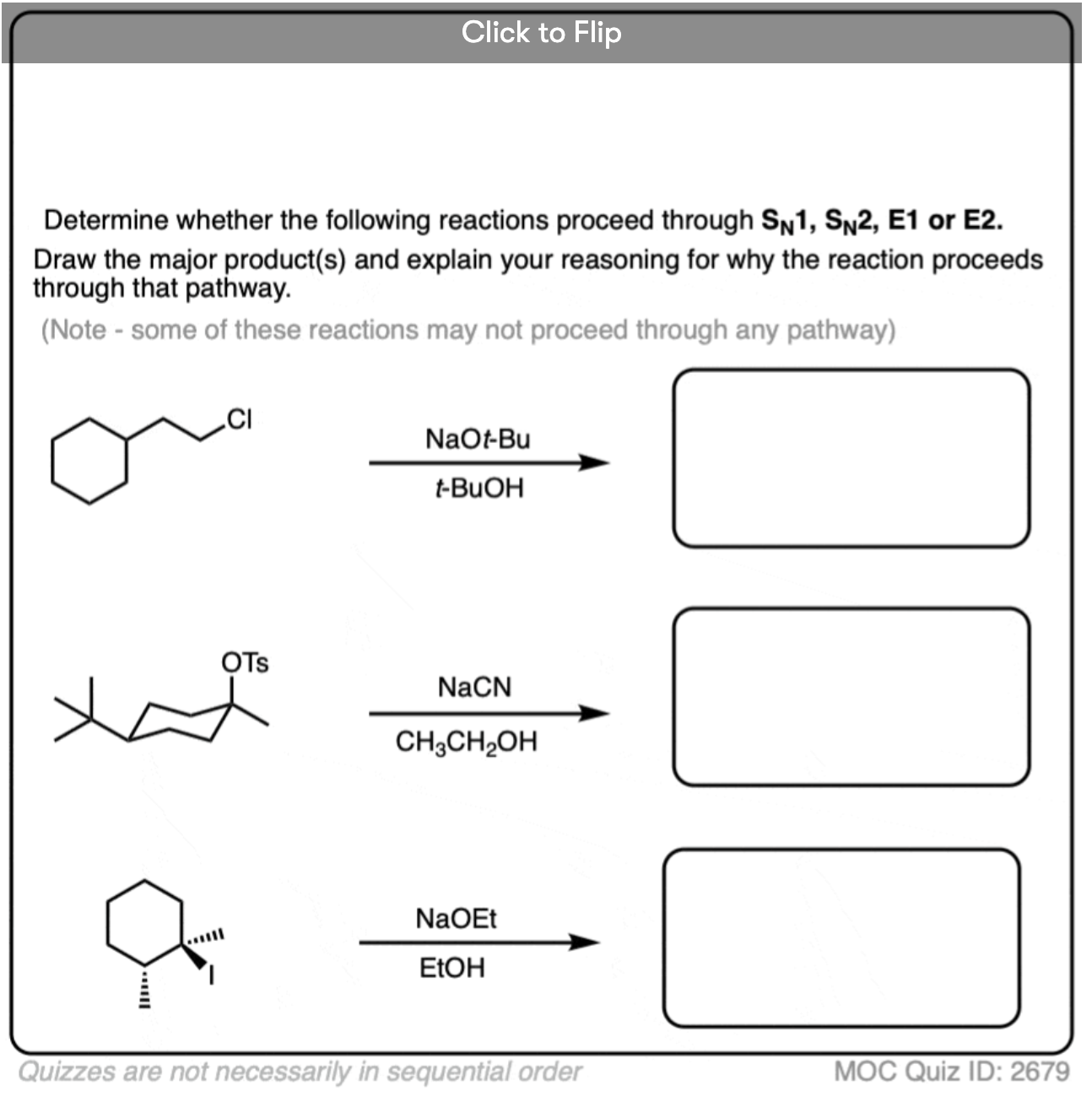
Become a MOC member to see the backside with answer.
The identity of the nucleophile/base is useful for separating out SN2/E2 from SN1/E1 pathways.
- If the substrate is primary the only exception to SN2 is if the nucleophile/base is strongly basic and bulky. Two prominent examples are the t-butoxide ion tBuO(-) and lithium diisopropyl amide (LDA) . (A third, more rarely seen example is the strong bulky base DBU). All of these reagents will perform E2 instead of SN2, giving the less substituted alkene (non-Zaitsev) product. (See article – Bulky Bases In Elimination Reactions).
- If the substrate is secondary and the nucleophile is strong but weakly basic, it’s SN2, particularly in a polar aprotic solvent like DMF, DMSO, acetone or acetonitrile. “Weakly basic” here means the conjugate acid has a pKa of 12 and below. So thiolates RS(-) are “weakly basic” but hydroxide [HO(-)] and alkoxide [RO(-)] are not.
- If the substrate is secondary and the nucleophile is strongly basic, it’s E2. This is definitely the case for acetylides (the conjugate bases of terminal acetylenes, pKa = 25) and amides (the conjugate bases of amines, pKa = 35-38). For hydroxides (HO-) and alkoxides (RO-) confirm with your instructor.
- If the substrate is secondary and the nucleophile is weak, it’s possibly SN1/E1. In particular look out for examples where carbocation rearrangements can occur, because these are commonly tested in this situation.
- If the substrate is tertiary and the nucleophile is weak, you’re likely looking at SN1/E1
- If the substrate is tertiary and the nucleophile is strongly basic, then expect E2.
6. Heat Usually Favors Elimination
Sometimes the temperature is noted. If heat (or Δ) is indicated, that’s generally a clue that elimination will be taking place, since elimination reactions are promoted by heat.
With tertiary alkyl halides, E1 is generally the major pathway over SN1 in the presence of heat.
[See article: Deciding SN1/SN2/E1/E2: The Temperature]
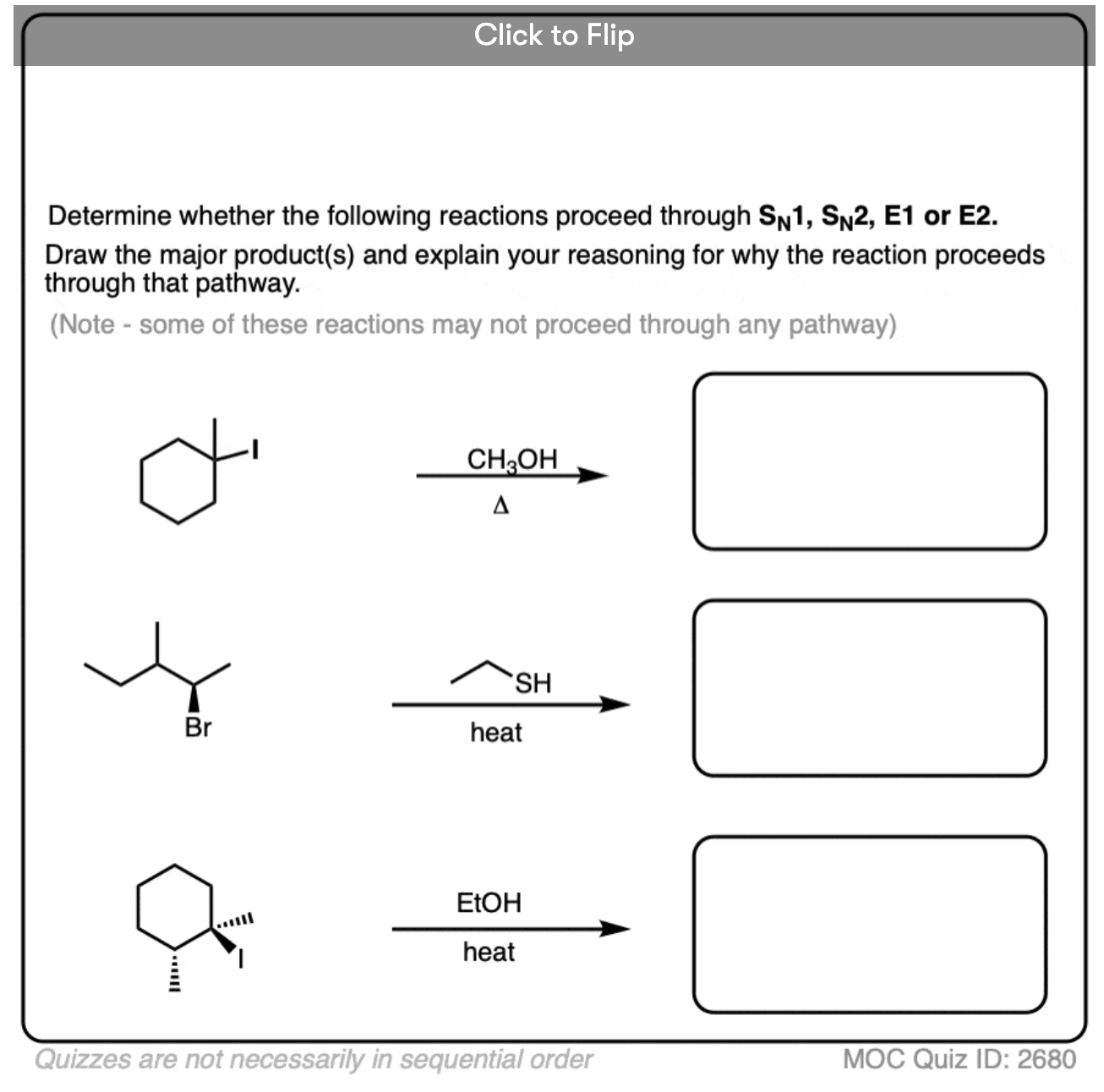
Become a member to see the clickable quiz with answers on the back.
With secondary alkyl halides, be alert for one possible exception to this – SN1 reactions with rearrangements.
Generally, leaving groups on secondary alkyl carbons don’t pop off very easily. Secondary carbocations are fairly unstable, after all!
In some instances, you may see “heat” in the presence of a secondary alkyl halide, which will increase the rate of the leaving group leaving to form the secondary carbocation. This can then be followed by a hydride or alkyl shift which will generate a more stable tertiary carbocation. Again, you might want to confirm this with your instructor.
7. The Role of Solvent. Also, Secondary Alkyl Halides With Strongly Basic Nucleophiles
You may note that we haven’t really discussed solvent here.
In SN1/E1 reactions, the nucleophile often is the solvent. So if you see a reaction where there is only “H2O” or “EtOH” , then you already know that the reaction is being run in a polar protic solvent with a poor nucleophile.
For secondary alkyl halides with weakly basic nucleophiles, polar aprotic solvents such as DMF, DMSO, acetone, and acetonitrile are generally good indicators for SN2 reactions, since these solvents enhance the nucleophilicity of many anions. (See article: All About Solvents)
A common dilemma arises in how to treat secondary alkyl halides with alkoxide and hydroxide nucleophiles in the presence of a polar aprotic solvent.
Looking at the experimental data, the only conclusion to draw is that E2 is still favored over SN2 in this situation. Check with your instructor what they do. Experimental results say E2, but there’s a lot of inconsistency.
See article: Deciding SN1/SN2/E1/E2 – Secondary Alkyl Halides With Strong Bases]
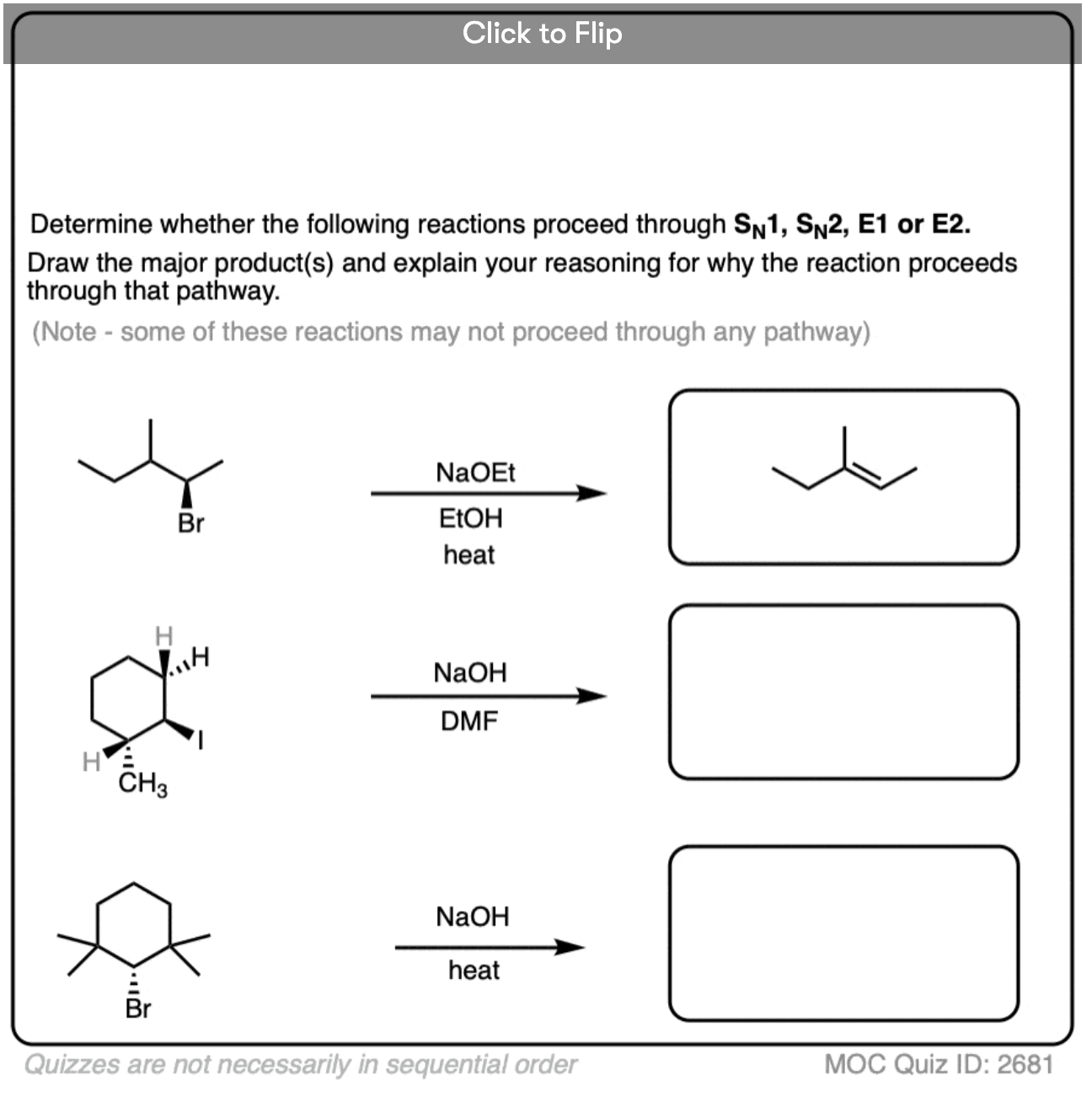
Become a MOC member to see the clickable quiz with answers on the back.
8. Summary
Once you have a reasonable idea of what reaction pathway is operating, makes sure you have adequate practice in actually drawing the final product of these reactions. Hopefully this article has been useful in this regard, but if you need more practice, consult the original articles on substitution and elimination, or join the MOC Membership for a host of representative practice problems.
Notes
Related Articles
- Alkyl Halide Reaction Map And Summary
- SN1 SN2 E1 E2 Practice Problems (MOC Membership)
- The SN1 Mechanism
- The SN2 Mechanism
- The E1 Reaction
- The E2 Mechanism
- Identifying Where Substitution and Elimination Reactions Happen
- Deciding SN1/SN2/E1/E2 (1) – The Substrate
- Deciding SN1/SN2/E1/E2 (2) – The Nucleophile/Base
- SN1 vs E1 and SN2 vs E2 : The Temperature
- Deciding SN1/SN2/E1/E2 – The Solvent
Note 1. From the original Quick N’ Dirty Guide To SN1/SN2/E1/E2:
“Writing this post makes me feel like a nun giving out condoms. I realize there will be many who are reading this an hour before their exam and are completely clueless on this subject. All I have to say is, God help you. And do more fricking practice problems so you don’t put yourself in this situation next time.”
Note 2. primary carbons that can form relatively stable carbocations (i.e. allylic/benzylic) may proceed through the SN1/E1 pathway if only poor nucleophiles are present.
Note 3. Some competent neutral bases/nucleophiles include:
- Thiols: (R-SH, H2S) Can be considered to be good nucleophiles, will participate in SN2 (but not E2) reactions.
- Amines: (R-NH2, R2NH, R3N); will act as nucleophiles (SN2) with primary alkyl halides; expect elimination (E2) with secondary and tertiary alkyl halides.
- Phosphines (PPh3) : Good nucleophiles, weak bases. Expect SN2 reactions with primary and secondary alkyl halides.
Quiz Yourself!
[Quizzes]
(Advanced) References and Further Reading
- An Improved Decision Tree for Predicting a Major Product in Competing Reactions
Kate J. Graham
Journal of Chemical Education 2014 91 (8), 1267-1268
DOI: 10.1021/ed400908g
From the abstract: “When organic chemistry students encounter competing reactions, they are often overwhelmed by the task of evaluating multiple factors that affect the outcome of a reaction. The use of a decision tree is a useful tool to teach students to evaluate a complex situation and propose a likely outcome. Specifically, a decision tree can help students predict a major product in substitution and elimination reactions.” - Comparing Nucleophilic Substitutions Versus Elimination Reactions In Comprehensive Introductory Organic Chemistry Textbooks
Donna J. Nelson
Proceedings of the Oklahoma Academy of Sciences 2022, 102, 105-114
DOI: Direct link (PDF)
A comparison of how 17 commonly used organic chemistry textbooks treat the key factors that differentiate SN1, SN2, E1, and E2 reactions (base strength, temperature, steric effects, nucleophilicity).
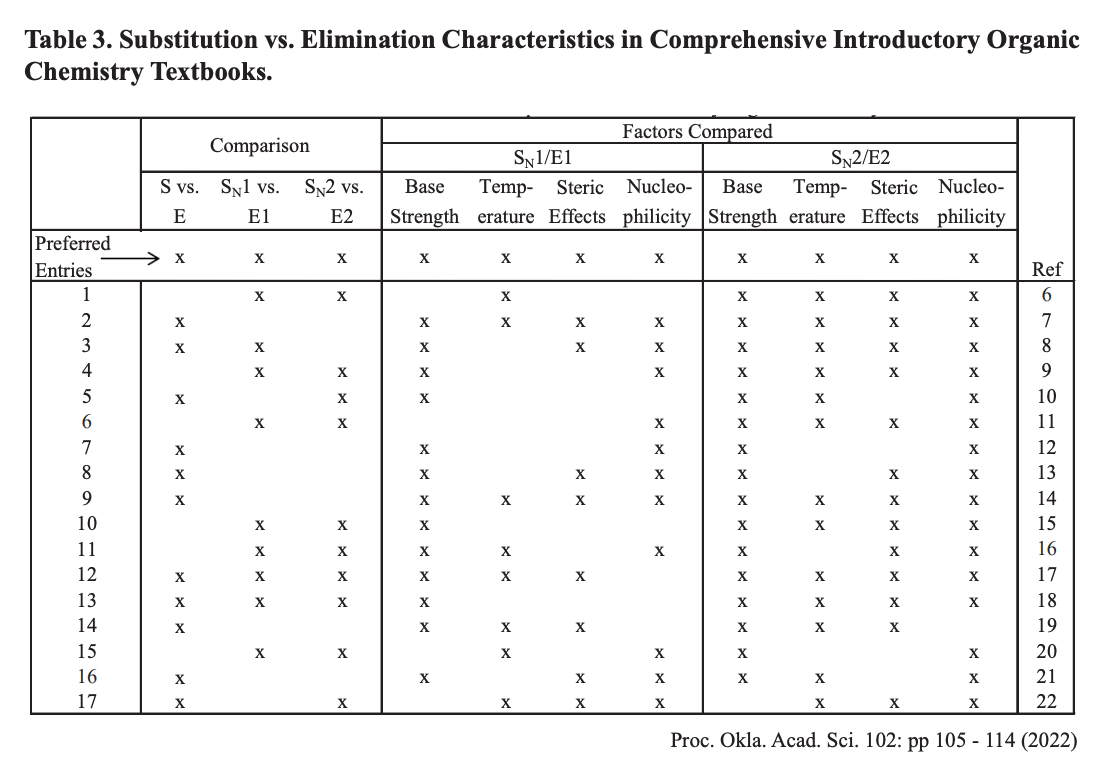
00 General Chemistry Review
01 Bonding, Structure, and Resonance
- How Do We Know Methane (CH4) Is Tetrahedral?
- Hybrid Orbitals and Hybridization
- How To Determine Hybridization: A Shortcut
- Orbital Hybridization And Bond Strengths
- Sigma bonds come in six varieties: Pi bonds come in one
- A Key Skill: How to Calculate Formal Charge
- The Four Intermolecular Forces and How They Affect Boiling Points
- 3 Trends That Affect Boiling Points
- How To Use Electronegativity To Determine Electron Density (and why NOT to trust formal charge)
- Introduction to Resonance
- How To Use Curved Arrows To Interchange Resonance Forms
- Evaluating Resonance Forms (1) - The Rule of Least Charges
- How To Find The Best Resonance Structure By Applying Electronegativity
- Evaluating Resonance Structures With Negative Charges
- Evaluating Resonance Structures With Positive Charge
- Exploring Resonance: Pi-Donation
- Exploring Resonance: Pi-acceptors
- In Summary: Evaluating Resonance Structures
- Drawing Resonance Structures: 3 Common Mistakes To Avoid
- How to apply electronegativity and resonance to understand reactivity
- Bond Hybridization Practice
- Structure and Bonding Practice Quizzes
- Resonance Structures Practice
02 Acid Base Reactions
- Introduction to Acid-Base Reactions
- Acid Base Reactions In Organic Chemistry
- The Stronger The Acid, The Weaker The Conjugate Base
- Walkthrough of Acid-Base Reactions (3) - Acidity Trends
- Five Key Factors That Influence Acidity
- Acid-Base Reactions: Introducing Ka and pKa
- How to Use a pKa Table
- The pKa Table Is Your Friend
- A Handy Rule of Thumb for Acid-Base Reactions
- Acid Base Reactions Are Fast
- pKa Values Span 60 Orders Of Magnitude
- How Protonation and Deprotonation Affect Reactivity
- Acid Base Practice Problems
03 Alkanes and Nomenclature
- Meet the (Most Important) Functional Groups
- Condensed Formulas: Deciphering What the Brackets Mean
- Hidden Hydrogens, Hidden Lone Pairs, Hidden Counterions
- Don't Be Futyl, Learn The Butyls
- Primary, Secondary, Tertiary, Quaternary In Organic Chemistry
- Branching, and Its Affect On Melting and Boiling Points
- The Many, Many Ways of Drawing Butane
- Wedge And Dash Convention For Tetrahedral Carbon
- Common Mistakes in Organic Chemistry: Pentavalent Carbon
- Table of Functional Group Priorities for Nomenclature
- Summary Sheet - Alkane Nomenclature
- Organic Chemistry IUPAC Nomenclature Demystified With A Simple Puzzle Piece Approach
- Boiling Point Quizzes
- Organic Chemistry Nomenclature Quizzes
04 Conformations and Cycloalkanes
- Staggered vs Eclipsed Conformations of Ethane
- Conformational Isomers of Propane
- Newman Projection of Butane (and Gauche Conformation)
- Introduction to Cycloalkanes
- Geometric Isomers In Small Rings: Cis And Trans Cycloalkanes
- Calculation of Ring Strain In Cycloalkanes
- Cycloalkanes - Ring Strain In Cyclopropane And Cyclobutane
- Cyclohexane Conformations
- Cyclohexane Chair Conformation: An Aerial Tour
- How To Draw The Cyclohexane Chair Conformation
- The Cyclohexane Chair Flip
- The Cyclohexane Chair Flip - Energy Diagram
- Substituted Cyclohexanes - Axial vs Equatorial
- Ranking The Bulkiness Of Substituents On Cyclohexanes: "A-Values"
- Cyclohexane Chair Conformation Stability: Which One Is Lower Energy?
- Fused Rings - Cis-Decalin and Trans-Decalin
- Naming Bicyclic Compounds - Fused, Bridged, and Spiro
- Bredt's Rule (And Summary of Cycloalkanes)
- Newman Projection Practice
- Cycloalkanes Practice Problems
05 A Primer On Organic Reactions
- The Most Important Question To Ask When Learning a New Reaction
- Curved Arrows (for reactions)
- Nucleophiles and Electrophiles
- The Three Classes of Nucleophiles
- Nucleophilicity vs. Basicity
- What Makes A Good Nucleophile?
- What Makes A Good Leaving Group?
- 3 Factors That Stabilize Carbocations
- Equilibrium and Energy Relationships
- 7 Factors that stabilize negative charge in organic chemistry
- 7 Factors That Stabilize Positive Charge in Organic Chemistry
- What's a Transition State?
- Hammond's Postulate
- Learning Organic Chemistry Reactions: A Checklist (PDF)
- Introduction to Oxidative Cleavage Reactions
06 Free Radical Reactions
- Free Radical Reactions
- 3 Factors That Stabilize Free Radicals
- Bond Strengths And Radical Stability
- Free Radical Initiation: Why Is "Light" Or "Heat" Required?
- Initiation, Propagation, Termination
- Monochlorination Products Of Propane, Pentane, And Other Alkanes
- Selectivity In Free Radical Reactions
- Selectivity in Free Radical Reactions: Bromination vs. Chlorination
- Halogenation At Tiffany's
- Allylic Bromination
- Bonus Topic: Allylic Rearrangements
- In Summary: Free Radicals
- Synthesis (2) - Reactions of Alkanes
- Free Radicals Practice Quizzes
07 Stereochemistry and Chirality
- Types of Isomers: Constitutional Isomers, Stereoisomers, Enantiomers, and Diastereomers
- How To Draw The Enantiomer Of A Chiral Molecule
- How To Draw A Bond Rotation
- Introduction to Assigning (R) and (S): The Cahn-Ingold-Prelog Rules
- Assigning Cahn-Ingold-Prelog (CIP) Priorities (2) - The Method of Dots
- Enantiomers vs Diastereomers vs The Same? Two Methods For Solving Problems
- Assigning R/S To Newman Projections (And Converting Newman To Line Diagrams)
- How To Determine R and S Configurations On A Fischer Projection
- The Meso Trap
- Optical Rotation, Optical Activity, and Specific Rotation
- Optical Purity and Enantiomeric Excess
- What's a Racemic Mixture?
- Chiral Allenes And Chiral Axes
- Stereochemistry Practice Problems and Quizzes
08 Substitution Reactions
- Nucleophilic Substitution Reactions - Introduction
- Two Types of Nucleophilic Substitution Reactions
- The SN2 Mechanism
- Why the SN2 Reaction Is Powerful
- The SN1 Mechanism
- The Conjugate Acid Is A Better Leaving Group
- Comparing the SN1 and SN2 Reactions
- Polar Protic? Polar Aprotic? Nonpolar? All About Solvents
- Steric Hindrance is Like a Fat Goalie
- Common Blind Spot: Intramolecular Reactions
- Substitution Practice - SN1
- Substitution Practice - SN2
09 Elimination Reactions
- Elimination Reactions (1): Introduction And The Key Pattern
- Elimination Reactions (2): The Zaitsev Rule
- Elimination Reactions Are Favored By Heat
- Two Elimination Reaction Patterns
- The E1 Reaction
- The E2 Mechanism
- E1 vs E2: Comparing the E1 and E2 Reactions
- Antiperiplanar Relationships: The E2 Reaction and Cyclohexane Rings
- Bulky Bases in Elimination Reactions
- Comparing the E1 vs SN1 Reactions
- Elimination (E1) Reactions With Rearrangements
- E1cB - Elimination (Unimolecular) Conjugate Base
- Elimination (E1) Practice Problems And Solutions
- Elimination (E2) Practice Problems and Solutions
10 Rearrangements
11 SN1/SN2/E1/E2 Decision
- Identifying Where Substitution and Elimination Reactions Happen
- Deciding SN1/SN2/E1/E2 (1) - The Substrate
- Deciding SN1/SN2/E1/E2 (2) - The Nucleophile/Base
- SN1 vs E1 and SN2 vs E2 : The Temperature
- Deciding SN1/SN2/E1/E2 - The Solvent
- Wrapup: The Key Factors For Determining SN1/SN2/E1/E2
- Alkyl Halide Reaction Map And Summary
- SN1 SN2 E1 E2 Practice Problems
12 Alkene Reactions
- E and Z Notation For Alkenes (+ Cis/Trans)
- Alkene Stability
- Alkene Addition Reactions: "Regioselectivity" and "Stereoselectivity" (Syn/Anti)
- Stereoselective and Stereospecific Reactions
- Hydrohalogenation of Alkenes and Markovnikov's Rule
- Hydration of Alkenes With Aqueous Acid
- Rearrangements in Alkene Addition Reactions
- Halogenation of Alkenes and Halohydrin Formation
- Oxymercuration Demercuration of Alkenes
- Hydroboration Oxidation of Alkenes
- m-CPBA (meta-chloroperoxybenzoic acid)
- OsO4 (Osmium Tetroxide) for Dihydroxylation of Alkenes
- Palladium on Carbon (Pd/C) for Catalytic Hydrogenation of Alkenes
- Cyclopropanation of Alkenes
- A Fourth Alkene Addition Pattern - Free Radical Addition
- Alkene Reactions: Ozonolysis
- Summary: Three Key Families Of Alkene Reaction Mechanisms
- Synthesis (4) - Alkene Reaction Map, Including Alkyl Halide Reactions
- Alkene Reactions Practice Problems
13 Alkyne Reactions
- Acetylides from Alkynes, And Substitution Reactions of Acetylides
- Partial Reduction of Alkynes With Lindlar's Catalyst
- Partial Reduction of Alkynes With Na/NH3 To Obtain Trans Alkenes
- Alkyne Hydroboration With "R2BH"
- Hydration and Oxymercuration of Alkynes
- Hydrohalogenation of Alkynes
- Alkyne Halogenation: Bromination and Chlorination of Alkynes
- Oxidation of Alkynes With O3 and KMnO4
- Alkenes To Alkynes Via Halogenation And Elimination Reactions
- Alkynes Are A Blank Canvas
- Synthesis (5) - Reactions of Alkynes
- Alkyne Reactions Practice Problems With Answers
14 Alcohols, Epoxides and Ethers
- Alcohols - Nomenclature and Properties
- Alcohols Can Act As Acids Or Bases (And Why It Matters)
- Alcohols - Acidity and Basicity
- The Williamson Ether Synthesis
- Ethers From Alkenes, Tertiary Alkyl Halides and Alkoxymercuration
- Alcohols To Ethers via Acid Catalysis
- Cleavage Of Ethers With Acid
- Epoxides - The Outlier Of The Ether Family
- Opening of Epoxides With Acid
- Epoxide Ring Opening With Base
- Making Alkyl Halides From Alcohols
- Tosylates And Mesylates
- PBr3 and SOCl2
- Elimination Reactions of Alcohols
- Elimination of Alcohols To Alkenes With POCl3
- Alcohol Oxidation: "Strong" and "Weak" Oxidants
- Demystifying The Mechanisms of Alcohol Oxidations
- Protecting Groups For Alcohols
- Thiols And Thioethers
- Calculating the oxidation state of a carbon
- Oxidation and Reduction in Organic Chemistry
- Oxidation Ladders
- SOCl2 Mechanism For Alcohols To Alkyl Halides: SN2 versus SNi
- Alcohol Reactions Roadmap (PDF)
- Alcohol Reaction Practice Problems
- Epoxide Reaction Quizzes
- Oxidation and Reduction Practice Quizzes
15 Organometallics
- What's An Organometallic?
- Formation of Grignard and Organolithium Reagents
- Organometallics Are Strong Bases
- Reactions of Grignard Reagents
- Protecting Groups In Grignard Reactions
- Synthesis Problems Involving Grignard Reagents
- Grignard Reactions And Synthesis (2)
- Organocuprates (Gilman Reagents): How They're Made
- Gilman Reagents (Organocuprates): What They're Used For
- The Heck, Suzuki, and Olefin Metathesis Reactions (And Why They Don't Belong In Most Introductory Organic Chemistry Courses)
- Reaction Map: Reactions of Organometallics
- Grignard Practice Problems
16 Spectroscopy
- Degrees of Unsaturation (or IHD, Index of Hydrogen Deficiency)
- Conjugation And Color (+ How Bleach Works)
- Introduction To UV-Vis Spectroscopy
- UV-Vis Spectroscopy: Absorbance of Carbonyls
- UV-Vis Spectroscopy: Practice Questions
- Bond Vibrations, Infrared Spectroscopy, and the "Ball and Spring" Model
- Infrared Spectroscopy: A Quick Primer On Interpreting Spectra
- IR Spectroscopy: 4 Practice Problems
- 1H NMR: How Many Signals?
- Homotopic, Enantiotopic, Diastereotopic
- Diastereotopic Protons in 1H NMR Spectroscopy: Examples
- 13-C NMR - How Many Signals
- Liquid Gold: Pheromones In Doe Urine
- Natural Product Isolation (1) - Extraction
- Natural Product Isolation (2) - Purification Techniques, An Overview
- Structure Determination Case Study: Deer Tarsal Gland Pheromone
17 Dienes and MO Theory
- What To Expect In Organic Chemistry 2
- Are these molecules conjugated?
- Conjugation And Resonance In Organic Chemistry
- Bonding And Antibonding Pi Orbitals
- Molecular Orbitals of The Allyl Cation, Allyl Radical, and Allyl Anion
- Pi Molecular Orbitals of Butadiene
- Reactions of Dienes: 1,2 and 1,4 Addition
- Thermodynamic and Kinetic Products
- More On 1,2 and 1,4 Additions To Dienes
- s-cis and s-trans
- The Diels-Alder Reaction
- Cyclic Dienes and Dienophiles in the Diels-Alder Reaction
- Stereochemistry of the Diels-Alder Reaction
- Exo vs Endo Products In The Diels Alder: How To Tell Them Apart
- HOMO and LUMO In the Diels Alder Reaction
- Why Are Endo vs Exo Products Favored in the Diels-Alder Reaction?
- Diels-Alder Reaction: Kinetic and Thermodynamic Control
- The Retro Diels-Alder Reaction
- The Intramolecular Diels Alder Reaction
- Regiochemistry In The Diels-Alder Reaction
- The Cope and Claisen Rearrangements
- Electrocyclic Reactions
- Electrocyclic Ring Opening And Closure (2) - Six (or Eight) Pi Electrons
- Diels Alder Practice Problems
- Molecular Orbital Theory Practice
18 Aromaticity
- Introduction To Aromaticity
- Rules For Aromaticity
- Huckel's Rule: What Does 4n+2 Mean?
- Aromatic, Non-Aromatic, or Antiaromatic? Some Practice Problems
- Antiaromatic Compounds and Antiaromaticity
- The Pi Molecular Orbitals of Benzene
- The Pi Molecular Orbitals of Cyclobutadiene
- Frost Circles
- Aromaticity Practice Quizzes
19 Reactions of Aromatic Molecules
- Electrophilic Aromatic Substitution: Introduction
- Activating and Deactivating Groups In Electrophilic Aromatic Substitution
- Electrophilic Aromatic Substitution - The Mechanism
- Ortho-, Para- and Meta- Directors in Electrophilic Aromatic Substitution
- Understanding Ortho, Para, and Meta Directors
- Why are halogens ortho- para- directors?
- Disubstituted Benzenes: The Strongest Electron-Donor "Wins"
- Electrophilic Aromatic Substitutions (1) - Halogenation of Benzene
- Electrophilic Aromatic Substitutions (2) - Nitration and Sulfonation
- EAS Reactions (3) - Friedel-Crafts Acylation and Friedel-Crafts Alkylation
- Intramolecular Friedel-Crafts Reactions
- Nucleophilic Aromatic Substitution (NAS)
- Nucleophilic Aromatic Substitution (2) - The Benzyne Mechanism
- Reactions on the "Benzylic" Carbon: Bromination And Oxidation
- The Wolff-Kishner, Clemmensen, And Other Carbonyl Reductions
- More Reactions on the Aromatic Sidechain: Reduction of Nitro Groups and the Baeyer Villiger
- Aromatic Synthesis (1) - "Order Of Operations"
- Synthesis of Benzene Derivatives (2) - Polarity Reversal
- Aromatic Synthesis (3) - Sulfonyl Blocking Groups
- Birch Reduction
- Synthesis (7): Reaction Map of Benzene and Related Aromatic Compounds
- Aromatic Reactions and Synthesis Practice
- Electrophilic Aromatic Substitution Practice Problems
20 Aldehydes and Ketones
- What's The Alpha Carbon In Carbonyl Compounds?
- Nucleophilic Addition To Carbonyls
- Aldehydes and Ketones: 14 Reactions With The Same Mechanism
- Sodium Borohydride (NaBH4) Reduction of Aldehydes and Ketones
- Grignard Reagents For Addition To Aldehydes and Ketones
- Wittig Reaction
- Hydrates, Hemiacetals, and Acetals
- Imines - Properties, Formation, Reactions, and Mechanisms
- All About Enamines
- Breaking Down Carbonyl Reaction Mechanisms: Reactions of Anionic Nucleophiles (Part 2)
- Aldehydes Ketones Reaction Practice
21 Carboxylic Acid Derivatives
- Nucleophilic Acyl Substitution (With Negatively Charged Nucleophiles)
- Addition-Elimination Mechanisms With Neutral Nucleophiles (Including Acid Catalysis)
- Basic Hydrolysis of Esters - Saponification
- Transesterification
- Proton Transfer
- Fischer Esterification - Carboxylic Acid to Ester Under Acidic Conditions
- Lithium Aluminum Hydride (LiAlH4) For Reduction of Carboxylic Acid Derivatives
- LiAlH[Ot-Bu]3 For The Reduction of Acid Halides To Aldehydes
- Di-isobutyl Aluminum Hydride (DIBAL) For The Partial Reduction of Esters and Nitriles
- Amide Hydrolysis
- Thionyl Chloride (SOCl2) And Conversion of Carboxylic Acids to Acid Halides
- Diazomethane (CH2N2)
- Carbonyl Chemistry: Learn Six Mechanisms For the Price Of One
- Making Music With Mechanisms (PADPED)
- Carboxylic Acid Derivatives Practice Questions
22 Enols and Enolates
- Keto-Enol Tautomerism
- Enolates - Formation, Stability, and Simple Reactions
- Kinetic Versus Thermodynamic Enolates
- Aldol Addition and Condensation Reactions
- Reactions of Enols - Acid-Catalyzed Aldol, Halogenation, and Mannich Reactions
- Claisen Condensation and Dieckmann Condensation
- Decarboxylation
- The Malonic Ester and Acetoacetic Ester Synthesis
- The Michael Addition Reaction and Conjugate Addition
- The Robinson Annulation
- Haloform Reaction
- The Hell–Volhard–Zelinsky Reaction
- Enols and Enolates Practice Quizzes
23 Amines
- The Amide Functional Group: Properties, Synthesis, and Nomenclature
- Basicity of Amines And pKaH
- 5 Key Basicity Trends of Amines
- The Mesomeric Effect And Aromatic Amines
- Nucleophilicity of Amines
- Alkylation of Amines (Sucks!)
- Reductive Amination
- The Gabriel Synthesis
- Some Reactions of Azides
- The Hofmann Elimination
- The Hofmann and Curtius Rearrangements
- The Cope Elimination
- Protecting Groups for Amines - Carbamates
- The Strecker Synthesis of Amino Acids
- Introduction to Peptide Synthesis
- Reactions of Diazonium Salts: Sandmeyer and Related Reactions
- Amine Practice Questions
24 Carbohydrates
- D and L Notation For Sugars
- Pyranoses and Furanoses: Ring-Chain Tautomerism In Sugars
- What is Mutarotation?
- Reducing Sugars
- The Big Damn Post Of Carbohydrate-Related Chemistry Definitions
- The Haworth Projection
- Converting a Fischer Projection To A Haworth (And Vice Versa)
- Reactions of Sugars: Glycosylation and Protection
- The Ruff Degradation and Kiliani-Fischer Synthesis
- Isoelectric Points of Amino Acids (and How To Calculate Them)
- Carbohydrates Practice
- Amino Acid Quizzes
25 Fun and Miscellaneous
- A Gallery of Some Interesting Molecules From Nature
- Screw Organic Chemistry, I'm Just Going To Write About Cats
- On Cats, Part 1: Conformations and Configurations
- On Cats, Part 2: Cat Line Diagrams
- On Cats, Part 4: Enantiocats
- On Cats, Part 6: Stereocenters
- Organic Chemistry Is Shit
- The Organic Chemistry Behind "The Pill"
- Maybe they should call them, "Formal Wins" ?
- Why Do Organic Chemists Use Kilocalories?
- The Principle of Least Effort
- Organic Chemistry GIFS - Resonance Forms
- Reproducibility In Organic Chemistry
- What Holds The Nucleus Together?
- How Reactions Are Like Music
- Organic Chemistry and the New MCAT
26 Organic Chemistry Tips and Tricks
- Common Mistakes: Formal Charges Can Mislead
- Partial Charges Give Clues About Electron Flow
- Draw The Ugly Version First
- Organic Chemistry Study Tips: Learn the Trends
- The 8 Types of Arrows In Organic Chemistry, Explained
- Top 10 Skills To Master Before An Organic Chemistry 2 Final
- Common Mistakes with Carbonyls: Carboxylic Acids... Are Acids!
- Planning Organic Synthesis With "Reaction Maps"
- Alkene Addition Pattern #1: The "Carbocation Pathway"
- Alkene Addition Pattern #2: The "Three-Membered Ring" Pathway
- Alkene Addition Pattern #3: The "Concerted" Pathway
- Number Your Carbons!
- The 4 Major Classes of Reactions in Org 1
- How (and why) electrons flow
- Grossman's Rule
- Three Exam Tips
- A 3-Step Method For Thinking Through Synthesis Problems
- Putting It Together
- Putting Diels-Alder Products in Perspective
- The Ups and Downs of Cyclohexanes
- The Most Annoying Exceptions in Org 1 (Part 1)
- The Most Annoying Exceptions in Org 1 (Part 2)
- The Marriage May Be Bad, But the Divorce Still Costs Money
- 9 Nomenclature Conventions To Know
- Nucleophile attacks Electrophile
27 Case Studies of Successful O-Chem Students
- Success Stories: How Corina Got The The "Hard" Professor - And Got An A+ Anyway
- How Helena Aced Organic Chemistry
- From a "Drop" To B+ in Org 2 – How A Hard Working Student Turned It Around
- How Serge Aced Organic Chemistry
- Success Stories: How Zach Aced Organic Chemistry 1
- Success Stories: How Kari Went From C– to B+
- How Esther Bounced Back From a "C" To Get A's In Organic Chemistry 1 And 2
- How Tyrell Got The Highest Grade In Her Organic Chemistry Course
- This Is Why Students Use Flashcards
- Success Stories: How Stu Aced Organic Chemistry
- How John Pulled Up His Organic Chemistry Exam Grades
- Success Stories: How Nathan Aced Organic Chemistry (Without It Taking Over His Life)
- How Chris Aced Org 1 and Org 2
- Interview: How Jay Got an A+ In Organic Chemistry
- How to Do Well in Organic Chemistry: One Student's Advice
- "America's Top TA" Shares His Secrets For Teaching O-Chem
- "Organic Chemistry Is Like..." - A Few Metaphors
- How To Do Well In Organic Chemistry: Advice From A Tutor
- Guest post: "I went from being afraid of tests to actually looking forward to them".
I wish I had found you ages ago, none of this has made sufficient sense. My exam tmrw will not be pretty, but hoping for the best regardless.
A day before the exam really you’re a life saver thank you and may god always bless and protect you i will pray for you man really thank you from the bottom of my heart ❤️
thanks man you saved my ass, i forgot the basics.
opening organic chemistry book after 2 months
I do not approve. But if the post was helpful, I am at least glad.
Each and every thing is wrong.
Specific examples?
You should mention that except CH3Cl all primary carbons undergo E1 mechanism because elimination requires at least 2 carbons(Though this may be taken under common sense
It does seem like common sense. However….. :- )
Yo James I just want to say how much i appreciate this quick and dirty guide! It really nicely summarizes the process in how to pick which pathway that is needed to take! Ive used a bunch of flow charts but nothing has helped me more than this guide!
Loved the post. its about 30 minutes before my exam and i was boned, but due to this page i will do great on my exam. if you don’t practice/read forums/ study you’ll get an A anyways.
Well, I hope you’re right Nick.
Question. If I have a primary substrate. No beta branching. And I have o-ch3 and CH3OH as the solvent. What would I be getting. I feel like I might have a mix of SN2 and E2 and I can’t really tell. CH3OH is a polar protic solvent which favors E2, but since it is a primary carbon and O-CH3 is a good nucleophile and a good base it might favor SN2.
Sounds like a Williamson Ether synthesis. SN2.
Hey James.You haven’t mentioned about 2° alkyl halide.Please generalize that too.And one more doubt. Will there substitution take when we use strong base but weak nucleophile for tertiary alkyl halide?
Haha! It’s not quite an hour before the test- about 23 hours. But yeah. I’m going to need loads of help and prayers. Thanks for your site by the way- it’s already helped me make sense out of things that have confused me for weeks. I’ve still got a ways to go, a long ways- but, thank you for helping me as I try to go that distance.
After all this time, I finally got all my questions right. James when I open an university, I’ll make you the Head of Chemistry department!!!
I am really thankful for this. I’m that type of student who is really clueless about OrgChem and my professor got mad today and she said that there will be quizzes every meeting and those would be in essay type of questions. I’m dying and now when I see this, I see a beam of light huhuhu thank you very much! :) God bless you, a nun giving out condoms.
Wow, thank you! This is really helpful!
That last paragraph rofl
Awesome! Actually reading this about 30 hours before the final lol. Really helpful though, I’ve done surprisingly well this semester but the final is the ACS exam. The prof told us there’s a ton of sn1 and sn2 on it so hopefully this info will help:)
My professor was amazing, but I can’t find my notebook from first semester so I’m glad I found this lol
How will you avoid or minimize the elimination product in a tertiary substrate undergoing substitution reaction?
By substitution reaction, I take it that you mean favor the SN1 vs E1, since a SN2 reaction will not occur on a tertiary substrate.
Some elimination products will always accompany an SN1 product (assuming that there are beta hydrogens adjacent to the leaving group.
Elimination reactions are favoured by heat. So one can favor the SN1 pathway to a greater extent by keeping the temperature down.
A flowchart would be great.
Its an excellent job in field of organic chemistry,priceless for us students.The author deserves a lot.If tomorrow i turn to be a millionaire,i would contribute a hefty sum of money to take this work ahead!
Whoever decided this guy shouldn’t be a professor should be fired.
Hah. My favourite comment ever
Having you explain this seriously puts my professor to shame.
That last paragraph helped relieve some stress before my OChem test in an hour.
Thanks so much for these guides! They are so helpful. Also the last paragraph definitely made me chuckle
Thank you so much for your postings!
This website has helped me fighting with organic chem a lots.
A week before my exam. This is a nice quick review on stuff i havent seen in ages. Now if only I could find some practice problems. :-)
Thank you for your cruel honesty. Many of us needs
To hear that. Keep it up!
I have a question about E1 and E1cb. Can you explain to me how to different them?
Here’s a post I wrote on the C1cb:
https://www.masterorganicchemistry.com/2020/02/11/e1cb-elimination-unimolecular-conjugate-base/
Your guide is much clear than my professor! It is really nice !!
Literally reading this an hour before my exam D; God help me!
Great Guide thanks a lot, but any idea of catchup or addition about E1cb reactions, got this all but am clueless about it…
This world needs more nuns handing out condoms. Great review, and thanks for pointing out the exceptions to the “quick and dirty” rules.
What an excellent resource, thank you for this insightful website.
@ Chemistry Student,
I believe you’re full of crap, and though you are right about the simplification, the information is not wrong. I’ve read my textbook before visiting this site and it serves as a great review!
“Writing this post makes me feel like a nun giving out condoms. I realize there will be many who are reading this an hour before their exam and are completely clueless on this subject. All I have to say is, God help you.” – hahahah… you got me!
Dont use this guide. It horribly over simplifies everything and a lot of it is just plain wrong. Just go study and learn the material in class or from the textbook.
It *does* over simplify things, you are right. Do you think you could be more specific about the criticisms? What would make this better? Thank you.
Chemistry Student you are not correct about the information to be wrong! It does simplify things, if you think you could do better at making a short guide to help out people why don’t you? I do agree that is simplifies everything and I do agree that one needs to study the materials from ones class. I do disagree with you saying not to use the guide to help one study. I have an extremely hard professor that teaches very little in class so I have to use every resource available to help learn the information. This site helps a ton and is a great SUPPLEMENTAL tool for learning the material. The class average on the 2nd test we took in class was a 40% if that tells you anything about our professor. The class is filled with extremely smart people that are going to be going to; medical school, PA or Pharm D. There is no need to be rude to the person that created it just because you do not like it. The person put in a lot of work and time to create it and should be thanked instead.
I do agree that the reactions are being over-simplified here, but isn’t that the point of a “Quick N’ Dirty Guide”? To be just that?
No one is implying that this should be a student’s sole resource when learning reactions and mechanisms. I’m pretty sure that the author intended this to be a supplement, nothing more. A textbook or simple rote learning through tons of problems is the more ideal way to go, yes. It is AMAZING how well a person can pick up these trends just by forcing themselves to work through more difficult reactions ad nauseum. But the whole point of this guide seems to be… exactly as the title describes it: a quick, easy little step-by-step guide to refresh the memory before a test. If a student were to only use this guide to learn the reactions, then, no, I wouldn’t be surprised if that student failed. But it also isn’t meant to be the one and only resource, either.
Moreover, the information isn’t “just plain wrong”. It is simplified, but it is not incorrect. Heck, the author even acknowledged that there are exceptions (as there are for everything in organic chemistry) and stated that this isn’t a substitute for learning the material through a class or textbook. It’s just a quick overall review of many of the trends. I really don’t understand your accusation, is all I’m sayin’, I suppose.
Guess She only had 20 minutes before her exam.
Listen here. If you don’t like this guide, then leave. This guide is freaking fantastic when your confused on a topic or want clarification on a top or just a refresher. Don’t assume that ALL learn from only this website. Sure some people do but 8/10 most people learn from a variety of sources– lecture, textbook, videos, professors. etc.
I love all the people defending the site! Hilarious :) I like the site too btw…
Ha! I have been studying thoroughly, I do get flustered easily though and this website really helps so much with putting concepts in different groups so I don’t get totally overwhelmed and pass out from the huge amount of information I have just been assaulted with.
“Writing this post makes me feel like a nun giving out condoms.” LMAO! This is why I love your writing, and can tolerate reading your blog about organic chemistry, James.
lol at last phrase. 4 hours before exam actually. but what the heck with this guide and a little bit of luck I will succeed!
there is no such thing as luck in organic chemistry
true!
Very true! Whenever I have guessed the product in any of my tests, I have never ever been correct!
YOU are amazing. This helps tons